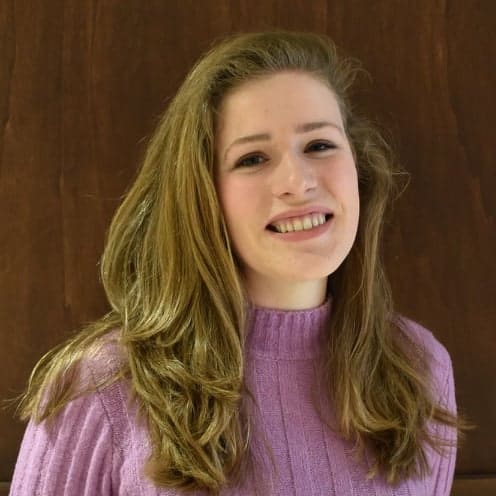
“Come Join Me in Rhyme”: A Look into Hillsdale’s Own Dead Poets Society
Written by Mary Caroline Whims
It’s a quiet Saturday night in Hillsdale. In a big white house at the corner where Oak meets Fayette, light glows from the living room window and faint strains of music can be heard. Inside, a dozen students fill low couches or sit cross-legged, chatting on the floor. Senior Dominic Bulger pours Turkish tea from a gleaming, double-decker set, and a plate of cookies circles the room. On the small table lies the reason for this gathering: leatherbound volumes of poetry. Welcome to Poetry Saturday, where friends meet to read dead poets, sing Irish drinking songs, and share in a tradition that’s been around for decades.
Poetry Saturday, sometimes shortened to “PoeSat,” is of ambiguous origin. Some claim it began with a similar Friday gathering at a house across campus, the Donnybrook. Others recall more recent traditions at a neighboring residence called the Halfway House, led by since-graduated students such as Benjamin Evans or Henry Brink. Currently, it meets at Bjørnheim. Regardless of how and where it all began, some things about PoeSat have remained the same over the years, and I want to share a few of these aspects with you.
First and most obviously, there’s the poetry itself. For many of us, the word “poetry” triggers unpleasant memories of AP Literature readings in high school, with obscure interpretations and lengthy papers. But rather than focusing on that drier, more academic side of poetry, PoeSat is a chance for people to simply read aloud and listen. In this way, PoeSat hearkens back to poetry’s original role: vocal performance. It’s a more natural, fun way to approach the wealth of literature our culture has inherited. (After all, even Homer himself would have sung The Odyssey aloud.)
Most nights focus on the work of one or two particular poets, which means that it’s a great way to get to know authors you haven’t read before. Past readings have included classic authors such as T.S. Eliot, John Keats, or Robert Frost.
Tonight, Junior Ceanna Hayes clears her throat and selects a page from a still-living author, Billy Collins, whose friendly, approachable lyrics make him a Saturday favorite. In his poem “The Lanyard,” an older man recalls his efforts as a child to please his mom “with a lanyard I made at summer camp.” He remembers his hopeful conclusion that after all she invested in him, this little lanyard “would be enough to make us even.” Hayes’s reading is followed by laughter and loud snaps.
Though the poet might change by week, the singing remains a consistent feature. The first song is always “A Health to the Company,” which invites all the “kind friends and companions” to come join together in rhyme. The Irish love to sing about heartbreak, so the well-worn songbooks include somber pieces like “Danny Boy” and “Wild Mountain Thyme”:
O the summer time is coming,
And the trees are sweetly blooming,
And the wild mountain thyme
Grows around the blooming heather.
Will ye go, lassie, go?
But not all of the songs are serious. The more rollicking ballads in the book (“The Auld Triangle,” “Wild Rover,” etc.) tend to focus on a few recurring themes: women, wine, ships, and adventure. The scoundrels and saints in these songs have stories worth telling. We remember them, and share in a little of a forgotten culture, every time we sing.
Shared poetry leads to deepened friendships. The weekly patterns of poetry and song become a liturgy of sorts, calling the group together again and again to a place of stability and rest. Over the years that I’ve been involved with Poetry Saturday, I’ve seen many wonderful memories made as the result of our gathering. One night, one of our friends recited the thirty-five-stanza “Wreck of the Deutschland” from memory. Another time, the attendees stamped so boisterously during the singing that the lights started to flicker. Sometimes, students stay late to have an acoustic jam session, or practice harmonizing with Latin choral music. Some PoeSats devolve into impromptu dance parties. It really depends on the night.
As the evening winds down, those who have serious homework (or earlier church services) trickle away, promising to come next week. Everyone is welcome to Poetry Saturday, and every year, the email list swells to include even more people. If you find yourself needing some fellowship and fun on a Saturday night, you know where to go. Bring a friend.
So fill to me the parting glass
And drink a health whate’er befalls,
Then gently rise and softly call
Good night and joy be to you all.
For further reading:
Poe Sat: Hillsdale’s Poetry Underground
 Mary Caroline Whims, ’21, studies English at Hillsdale College, where she serves as editor-in-chief of Fool’s Talk magazine. On a given day, you can find her playing in an intramural basketball game, waxing poetic about church windows, or postponing homework to make a good conversation last longer.
Mary Caroline Whims, ’21, studies English at Hillsdale College, where she serves as editor-in-chief of Fool’s Talk magazine. On a given day, you can find her playing in an intramural basketball game, waxing poetic about church windows, or postponing homework to make a good conversation last longer.
Published in January 2021